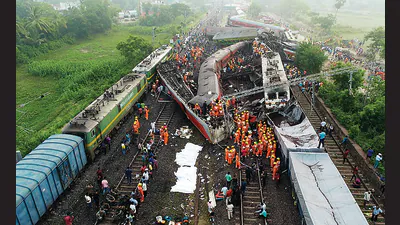A week after the train accident in Odisha’s Balasore district, which left 288 passengers dead and over 1,200 injured, Prakash Ram, a 22-year-old migrant labourer from Pathra village in the Gopalganj district of Bihar, is thankful to be alive but worries about his future employment because one of his legs was amputated.
When a few coaches of the Coromondel Express that had derailed at Bahanaga Bazar station struck the last two general coaches of his train, Ram, who had been working at a ceramic tile factory in Ongole city of the Prakasam district in Andhra Pradesh for the previous two years, was on his way home on the Yeshwantpur-Howrah Express.
Rezaul Bafadar, a 25-year-old mason from Murshidabad in West Bengal who has spent the last 10 years working in Kollam in Kerala, is a little bit luckier than Ram, but the deep gashes and shattered bone he sustained in his right arm would prevent him from working for at least a year.
He was thrown around on the impact of the collision while riding in one of the Coromondel Express’s sleeper coaches without a confirmed berth. He was in a coma when he was discovered, and it took him four days in an intensive care unit to regain consciousness.
“I had come home a week before the train accident for some domestic emergency and was rushing back to work. I am the only earning member of my family. The ₹2 lakh that the railways have given as compensation would not last long,” said Bafadar. So I have to go back to work, but I don’t know how long it would take me to lift even a trowel and hammer.”
As his sleeper coach in the Coromondel Express was thrown around before hitting the ground, Shristidhar Sabak, a 23-year-old mason from Bagnan in the Purulia region of West Bengal who was working in Vijaywada in Andhra Pradesh, also sustained a fracture in his left foot. Orphan Sabak writhes in pain as he tries to move a limb laced with stainless steel devices, yet he is concerned about when he will be able to return to work.
“In Vijaywada, I got ₹500 a day. But if I don’t join duty, it would be difficult for my family to survive,” said Sabak.
In orthopaedics ward, Dipak Haldar from South 24 Pargana district of Bengal is bewildered over his 30-year-old Subroto Haldar passing our every now and then after he was rescued from the accident spot. Subroto worked in a factory in Kerala and is the only breadwinner in the family. “My elder son is mentally challenged. If Subroto does not recover, then our family is doomed,” said Haldar.
According to Umi Daniel, an expert on migrant workers, the railway accident has renewed attention on the dangers that migrant workers from Odisha, Bengal, Bihar, Jharkhand, and Assam confront when they go to work in southern states.
“While workplace hazard is one major challenge, the death and devastation that they face while travelling is a big setback they none of the migrant labourers are prepared for. The compensation that the railways and the state government are giving would not be enough,” Daniel said.
“Instead, the government, Indian Railways and the corporate sector should work together to map the specific needs of each of the migrant labourers who have been killed or wounded.”
Fulagan Kamat, a 45-year-old from the Bihar district of Madhubani, said the steel rod inserted in his right thigh and the deep gash on his shoulder hurt him most of the time while he is receiving treatment in the surgery and orthopaedics wards of the SCB Medical College and Hospital, where the majority of the injured migrant labourers are receiving care. Kamat was returning to his place of employment on the Coromondel Express after six years of working as a kitchen assistant at a hotel in Chennai.
“I am worried that I would not be able to work again in the hotel for next one year. With five daughters and a son at home, I need to be back on my feet,” Kamat said. “I can’t let a train accident deter me.”
Also Read: TCS onboards 44,000 freshers in FY23, honors all job offers
Keep watching our YouTube Channel ‘DNP INDIA’. Also, please subscribe and follow us on FACEBOOK












